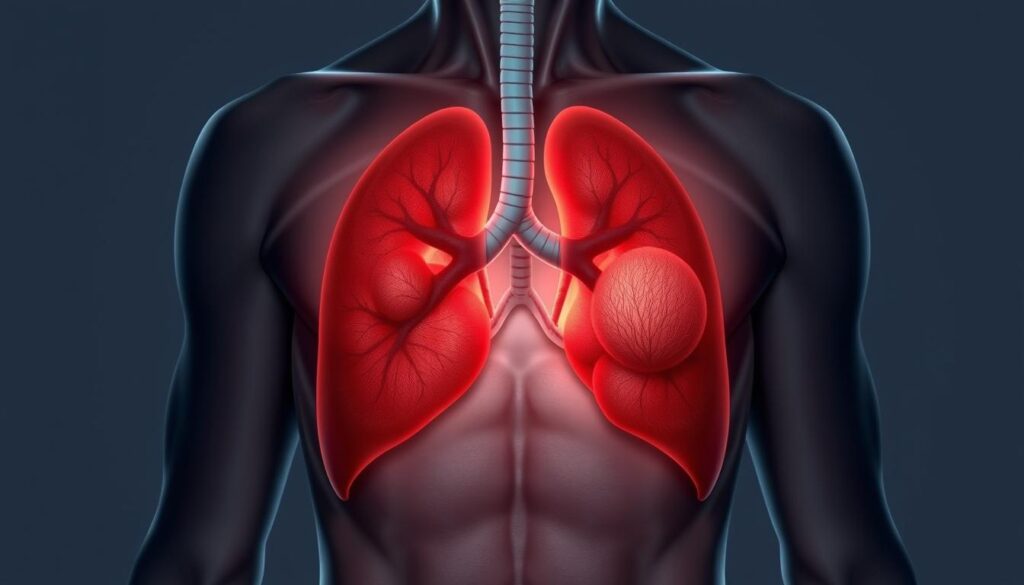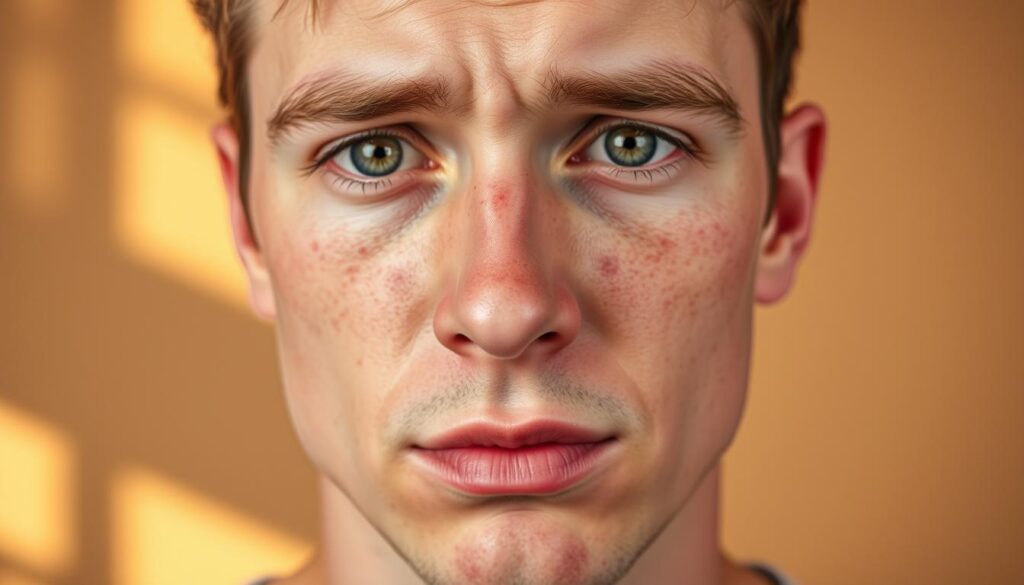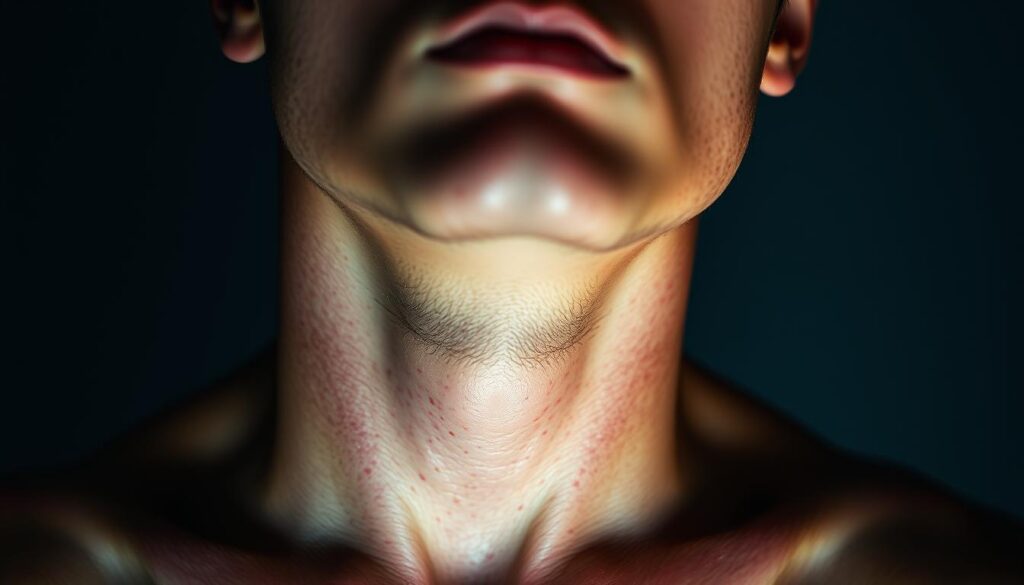Would you know if you had HIV’s first signs? Knowing the symptoms of HIV in men is crucial. Millions worldwide live with HIV, and catching it early is key to managing it.
HIV symptoms in men can be tricky to spot. They often look like common illnesses. It’s vital to recognize these signs early for timely treatment. The body changes a lot when first infected with HIV, making it a challenge to handle.
This guide will cover important early signs, how HIV is spread, and health indicators men should know. By learning about HIV symptoms, we help people take care of their health.
We’ll talk about symptoms in the early stages and how to manage HIV long-term. This knowledge is powerful and can greatly improve your health.
Understanding HIV Infection in Men

HIV is a complex virus that affects men’s health in unique ways. It’s important to know the signs of HIV infection in men to catch it early. The virus weakens the immune system, making it harder for the body to fight off infections.
Men face specific challenges when dealing with HIV. Symptoms and how the virus is spread can vary. Spotting early symptoms is key to getting the right medical help.
Biological Impact on Male Immune System
HIV targets CD4 T-cells, which are vital for the immune system. This attack weakens the body’s defense, leading to more health problems.
- Rapid decline in immune cell count
- Increased vulnerability to secondary infections
- Potential hormonal disruptions
Primary Transmission Routes
Knowing how HIV is spread helps men stay safe and protect their partners. Main ways include:
- Unprotected sexual contact
- Sharing contaminated needles
- Blood transfusions
- Mother-to-child transmission during pregnancy
Critical Importance of Early Detection
Early detection can dramatically improve treatment outcomes and quality of life. Regular testing and knowing your risk factors are crucial. Recognizing early symptoms is also key to managing HIV exposure.
“Knowledge and proactive healthcare are the most powerful tools against HIV” – Dr. Anthony Fauci
Initial Signs and Symptoms of HIV in Men

Spotting the early signs of HIV in men can be tough. Many symptoms are mild and might seem like common colds. It’s key to know these signs to catch HIV early.
HIV’s first stage, acute HIV infection, hits within 2-4 weeks after infection. The body starts to fight the virus, causing different symptoms for everyone.
- Fever and elevated body temperature
- Severe fatigue and muscle aches
- Swollen lymph nodes
- Sore throat
- Skin rash
Some men show clear symptoms, while others might not notice anything. This makes getting tested by a doctor very important for a correct diagnosis.
| Symptom | Typical Duration | Severity |
|---|---|---|
| Fever | 1-2 weeks | Mild to moderate |
| Muscle Pain | 1-3 weeks | Moderate |
| Skin Rash | 1-2 weeks | Mild |
Doctors say to get tested right away if you have these symptoms and think you might have been exposed. Catching HIV early can lead to better treatment and slower virus growth.
Common HIV Symptoms in Men During Acute Phase
The acute phase of HIV infection is a critical time. It’s when the body first meets the virus. Knowing the symptoms in men during this time helps them get medical help quickly.

In the first weeks after getting infected, men may notice certain symptoms. These signs usually show up 2-4 weeks after infection.
Flu-like Symptoms
The body’s immune system causes flu-like symptoms:
- High-grade fever (typically 100.4°F-102.2°F)
- Severe muscle and joint aches
- Intense fatigue and weakness
- Persistent night sweats
- Swollen lymph nodes
Physical Changes
Men may also see physical changes during this time:
- Unexplained weight loss
- Skin rashes or lesions
- Recurring mouth or throat ulcers
- Decreased appetite
Duration of Early Symptoms
The acute phase of HIV usually lasts 1-4 weeks. Most symptoms go away as the body gets used to the virus. Not all people will have the same symptoms, so seeing a doctor is very important.
Prompt medical testing is recommended if multiple symptoms persist or appear unexpectedly.
Late-Stage HIV Symptoms and Complications
As HIV advances in men, their immune system weakens. This leads to serious health issues. Late-stage HIV symptoms in men can be severe and affect many parts of the body.
The most critical hiv complications males face in advanced stages include:
- Dramatic weight loss
- Persistent fever
- Chronic respiratory infections
- Neurological complications
- Compromised cardiovascular health
Immunodeficiency becomes severe during late-stage HIV. This makes it easier for dangerous infections to attack. These infections can have severe effects on a weakened immune system.
| Body System | Potential Complications | Severity |
|---|---|---|
| Neurological | Cognitive decline | High |
| Respiratory | Pneumocystis pneumonia | Critical |
| Cardiovascular | Increased heart disease risk | Moderate-High |
Medical care is key in managing these symptoms. Regular check-ups and antiretroviral treatments can slow disease progress. This improves the quality of life for men with HIV.
Recognizing Opportunistic Infections in HIV-Positive Men
Men with HIV face big challenges because their immune system weakens. Opportunistic infections are a big risk for them. It’s key to catch them early and understand them well for health care.
HIV opportunistic infections can really hurt a man’s health and life quality. These infections happen when the body’s defenses are down.
Common Secondary Infections
People with HIV are at risk for many dangerous infections:
- Pneumocystis pneumonia
- Tuberculosis
- Candidiasis
- Cytomegalovirus
- Cryptococcal meningitis
Warning Signs of Disease Progression
Watching for signs of disease getting worse is important:
| Infection Type | Key Warning Signs |
|---|---|
| Respiratory Infections | Persistent cough, chest pain, trouble breathing |
| Fungal Infections | White patches in mouth, unexplained skin rashes |
| Neurological Issues | Severe headaches, vision changes, confusion |
When to Seek Medical Help
Getting medical help fast is key for HIV infections. Men should see a doctor right away if they have:
- Fever that lasts over 48 hours
- Significant weight loss
- Persistent night sweats
- Unexplained lymph node swelling
- Recurring infections
Early detection and professional medical advice can greatly help HIV-positive men with opportunistic infections.
HIV Testing and Diagnosis Methods for Men
It’s key for men to get tested for HIV early. This helps catch the infection before it gets worse. Doctors say men with many partners or who don’t use protection should get tested often.
There are several HIV tests for men to find out if they have the virus:
- Antibody Tests
- Antigen/Antibody Combination Tests
- Nucleic Acid Tests (NAT)
- Rapid HIV Tests
Each test has its own benefits in finding HIV infections:
| Test Type | Detection Window | Accuracy |
|---|---|---|
| Antibody Test | 23-90 days | 99.5% |
| Antigen/Antibody Test | 18-45 days | 99.7% |
| Nucleic Acid Test | 10-33 days | 99.9% |
Confidential testing is vital for a correct diagnosis and quick action. Men should talk to doctors to find the best test for them. This depends on their risk and health history.
Regular testing can greatly improve health and stop the virus from spreading.
Conclusion
It’s important for men to know the signs of HIV early. This helps in getting the right treatment quickly. If you notice symptoms that don’t go away, see a doctor right away.
Men with HIV need a lot of medical help and regular check-ups. Getting tested often is key for those at risk. Starting treatment early can make a big difference in your health.
Preventing HIV is all about education and being proactive. Doctors say it’s crucial to get tested regularly and know how HIV spreads. By staying informed, men can protect their health and lower risks.
Knowing about HIV helps men make better choices about their health. Even with a diagnosis, there’s hope thanks to modern medicine. With the right care and support, living with HIV can be manageable.
FAQ
What are the earliest symptoms of HIV in men?
Early HIV symptoms in men include flu-like signs like fever, tiredness, muscle pain, sore throat, and swollen lymph nodes. These symptoms start 2-4 weeks after infection and last a few weeks. It’s key to remember these symptoms are similar to many other viruses. So, getting tested for HIV is very important.
How long can a man have HIV without knowing?
A man can have HIV for 10-15 years without symptoms. This is because the virus slowly damages the immune system. Regular testing is vital, even more so for those at high risk.
What are the most common opportunistic infections in HIV-positive men?
HIV-positive men often get infections like pneumocystis pneumonia, tuberculosis, and candidiasis. These happen when the immune system is very weak. This usually happens when CD4 cell counts fall below 200 cells per cubic millimeter.
How accurate are HIV tests?
HIV tests are very accurate, with most detecting the virus with 99.7% accuracy. They can spot HIV as early as 2-6 weeks after exposure. For the best results, test 3 months after possible exposure.
Can HIV be transmitted through oral sex?
HIV can be passed through oral sex, though the risk is lower. The risk goes up with open sores or bleeding. Using dental dams can help lower the risk.
What are the late-stage symptoms of HIV in men?
Late HIV symptoms include big weight loss, constant fever, and chronic diarrhea. There’s also extreme tiredness, frequent infections, and neurological issues. The immune system is badly damaged, making the body very sick.
How effective is modern HIV treatment?
Modern HIV treatment, called ART, is very effective. It keeps the virus at undetectable levels and boosts the immune system. Many HIV-positive people now live as long as those without the virus.
What should I do if I suspect I’ve been exposed to HIV?
If you think you’ve been exposed to HIV, see a doctor right away. They can talk about post-exposure prophylaxis (PEP). This can prevent HIV if started within 72 hours. Also, get tested and keep up with regular health check-ups.
